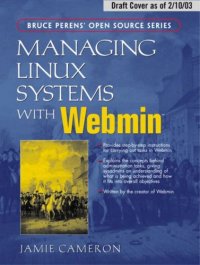
Ebook: Managing Linux systems with Webmin: system administration and module development
Author: Jamie Cameron
- Genre: Business // Management: Project Management
- Series: Bruce Perens' Open source series
- Year: 2004
- Publisher: Prentice Hall
- City: Upper Saddle River, NJ
- Language: English
- pdf
This chapter explains what Webmin is, why it was written, and what you can expect from this book. What is Webmin? Webmin is a program that simplifies the process of managing a Linux or UNIX system. Traditionally, you have needed to manually edit configuration files and run commands to create accounts, set up web servers, or manage email forwarding. Webmin now lets you perform these tasks through an easy-to-use web interface, and automatically updates all of the required configuration files for you. This makes the job of administering your system much easier. Some of the things that you can do with Webmin include: Creating, editing, and deleting UNIX login accounts on your system Exporting files and directories to other systems with the NFS protocol Setting up disk quotas to control how much space users can take up with their files Installing, viewing, and removing software packages in RPM and other formats Changing your system's IP address, DNS settings, and routing configuration Setting up a firewall to protect your computer or give hosts on an internal LAN access to the Internet Creating and configuring virtual web sites for the Apache Web server Managing databases, tables, and fields in a MySQL or PostgreSQL database server Sharing files with Windows systems by configuring Samba These are just a few of the available functions. Webmin lets you configure almost all of the common services and popular servers on UNIX systems using a simple web interface. It protects you from the syntax errors and other mistakes that are often made when editing configuration files directly, and warns you before potentially dangerous actions. Because Webmin is accessed though a web browser, you can log in to it from any system that is connected to yours through a network. There is absolutely no difference between running it locally and running it remotely, and it is much easier to use over the network than other graphical configuration programs. Webmin has what is known as a modular design. This means that each of its functions is contained in a module that can generally be installed or removed independently from the rest of the program. Each module is responsible for managing some service or server, such as UNIX users, the Apache Web server, or software packages. If you have been manually configuring your system up till now, any existing settings will be recognized by Webmin. It always reads the standard configuration files on your system and updates them directly, instead of using its own separate database. This means that you can freely mix Webmin, manual configuration, and other programs or scripts that work in the same way. Even though this book is written for Linux users, Webmin can be used on many other flavors of UNIX as well, such as Solaris, FreeBSD, and HP/UX. One of its biggest strengths is its understanding of the differences between all these operating systems and the way it adjusts its user interface and behavior to fit your OS. This means that it can often hide the underlying differences between each UNIX variant and present a similar or identical interface no matter which one you are using. Webmin on its own is not particularly useful though-;it is only a configuration tool, so you must have programs installed for it to configure. For example, the Apache module requires that the actual Apache Web server be installed. Fortunately, all of the services and servers that Webmin manages are either included with most Linux distributions as standard, or can be freely downloaded and installed. Who Should Use Webmin? Webmin was written for use by people who have some Linux experience but are not familiar with the intricacies of system administration.
Download the book Managing Linux systems with Webmin: system administration and module development for free or read online
Continue reading on any device:

Last viewed books
Related books
{related-news}
Comments (0)